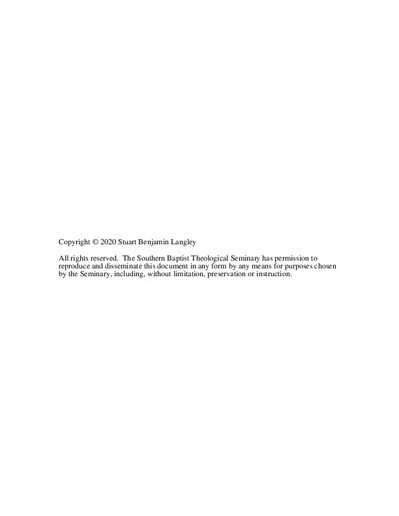| dc.contributor.advisor | Pennington, Jonathan T. | |
| dc.contributor.author | Langley, Stuart B. | |
| dc.date.accessioned | 2020-12-03T14:50:30Z | |
| dc.date.available | 2020-12-03T14:50:30Z | |
| dc.date.issued | 2020-12-01 | |
| dc.identifier.uri | https://hdl.handle.net/10392/6411 | |
| dc.description.abstract | This dissertation examines and catalogues the history of interpretation of the ambiguous speakers in John 3:16-21 and 3:31-36. The history of interpretation leads to the conclusion that the passages are best understood as spoken by Jesus, not the Evangelist. Chapter 1 introduces the topic and the disagreement within modern scholarship regarding the speakers.Part one contains the history of interpretation proper. Chapter 2 investigates the early Christian era including the second through sixth centuries. Authors throughout this period tend to identify Jesus as speaking in 3:16-21 and Jesus or the Baptist as speaking in 3:31-36. Few identify the Evangelist as speaking in one or both passages. In addition to this common interpretation, authors also correlate the identity of the speaker to a christological focus: Jesus/the Baptist is speaking when the focus is on the incarnation and the Evangelist is speaking when the focus is on the crucifixion.
Chapter 3 covers the medieval era and demonstrates a continuation of the findings from the previous period. Although slightly more authors identify the Evangelist as speaking, the correlation between speaker and christological focus remains in most cases. The exceptions are relegated to 3:31-36; no authors break the correlation with regard to 3:16-21.
Chapter 4 discusses the Reformation era and the new focus on the role of the Evangelist. Although these authors stress the importance of the Evangelist’s hand at work, the vast majority still attribute the words of both passages to either Jesus or the Baptist. Again, those that attribute the words to the Evangelist himself do so while discussing the crucifixion. Even in the Reformation era, authors still interpret 3:31-36 as the words of Jesus, although this phenomenon has become far less frequent. At the end of chapter 4, the early modern era comes into focus and shatters the established correlation. Several authors within a small time period attribute the words of 3:16-21 to Jesus while discussing the crucifixion.
Chapter 5 explores the modern discussion on these ambiguous speakers and demonstrates that scholars agree very little as to the identity of the speaker in either passage. Using various methods and coming from various ideological backgrounds, scholars arrive at similar conclusions. Conversely, scholars coming from the same backgrounds or applying the same methods might arrive at vastly different conclusions. For this reason, the connection between the theological focus and the identity of the speakers is of utmost importance.
Part two argues that both passages in John 3 should be attributes to Jesus in order to make the best sense of the theological focus of the chapter. Chapter 6 places John 3 within the larger context of the Book of Signs and the Gospel of John as a whole. By examining John’s larger rhetorical strategy, it becomes clear that John 3 is best understood as focused on the incarnation of the Christ and the testimony regarding Jesus’ self-revelation.
Chapter 7 offers a reinterpretation of John 3 with Jesus as the speaker. It examines both positive arguments for this reading as well as the negative arguments against it, and concludes that this reading best explains that God demonstrates his love for the world through giving his Son in the incarnation. Chapter 8 concludes the dissertation with a recapitulation of the arguments and a brief discussion on areas of further study. | en_US |
| dc.subject.lcsh | Bible. John, III, 16-21--Criticism, interpretation, etc. | en-us |
| dc.subject.lcsh | Bible. John, III, 31-36--Criticism, interpretation, etc. | en-us |
| dc.title | Who Says That God Loves the World? A Historical Argument to Identify the Ambiguous Speakers in John 3 | en_US |
| dc.type | Text | |
| dc.type | Electronic dissertation | en_US |
| dc.contributor.committee | Cook, William F., III | |
| dc.contributor.committee | Vickers, Brian J. | |
| dc.type.qualificationname | Ph.D. | en_US |
| dc.publisher.institution | Southern Baptist Theological Seminary | en_US |
| dc.publisher.department | School of Theology | |

